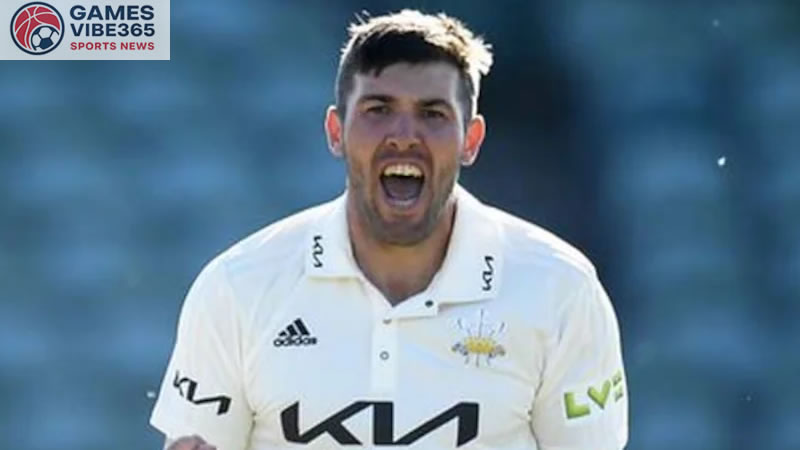
England’s cricketing landscape has seen a significant development, with all-rounder Jamie Overton announcing an indefinite break from red-ball cricket. The 31-year-old Surrey seamer, who played his most recent Test against India at The Oval in July, revealed that his body can no longer endure the demands of playing across all formats.
Overton’s decision reflects a growing trend among modern cricketers who are forced to choose between formats in order to prolong their careers. His battle with recurring injuries, particularly back stress fractures, has been a decisive factor in this move.
Overton’s Statement: A Tough but Necessary Call
Confirming his decision through the England and Wales Cricket Board (ECB), Overton shared his thoughts on stepping away from the red-ball game:
“After a great deal of thought, I have decided to take an indefinite break from red-ball cricket. First-class cricket laid the foundation for my career and gave me every opportunity I’ve had in the game. But with the sport now running across a 12-month calendar, it’s no longer possible for me to fully commit to every format, both physically and mentally. My focus now will be on white-ball cricket, and I’ll continue giving everything to perform at the highest level for as long as I can.”
His words capture the physical and mental strain cricketers face in an era where schedules leave little time for recovery.
A Career Interrupted by Injuries
Overton’s raw pace and all-round skills always made him an exciting prospect for England. However, his Test career has been limited to just two appearances due to persistent fitness challenges:
- Debut in 2022: He made an impressive Test debut against New Zealand, where his innings of 97 drew wide praise.
- Return in 2025: His second Test came three years later, against India earlier this summer.
Unfortunately, recurring back stress fractures have frequently derailed his ambitions in the longer format, restricting him from reaching his full red-ball potential.
The Role of Red-Ball Cricket in His Journey
Although stepping away now, Overton openly acknowledged the importance of first-class cricket in shaping his career. With 99 first-class matches to his name, his contributions at the county level—particularly for Surrey—have been invaluable.
Red-ball cricket has always been viewed as the foundation for English players, and Overton’s journey is no exception. His ability to deliver hostile spells with the ball and contribute vital runs with the bat made him a dependable figure in county championships.
Read More: Indians with the Most T20 Sixes in 2025 Who’s Leading the Power Game?
Shifting Gears to White-Ball Cricket
By focusing exclusively on limited-overs formats, Overton aims to extend his playing career and maximize his impact. White-ball cricket not only places less physical strain on fast bowlers but also provides greater opportunities for international exposure in tournaments around the globe.
- Upcoming Assignments: Overton has been included in England’s squad for the upcoming three-match ODI series against South Africa at Headingley.
- He will also feature in the T20Is against the Proteas and the one-day series against Ireland in September.
This pivot suggests that Overton could establish himself as a regular in England’s white-ball setup, particularly given the team’s constant search for versatile all-rounders.
A Wider Trend in Modern Cricket
Overton’s decision mirrors a growing challenge for cricketers worldwide. With cricket’s calendar now spanning the entire year, players must often choose formats strategically:
- Ben Stokes, England’s Test captain, temporarily retired from ODIs before making a comeback, citing workload management.
- Pat Cummins and Kagiso Rabada have also struggled with injuries due to the relentless scheduling across all formats.
- Franchise leagues, such as the IPL, SA20, and The Hundred, add another layer of pressure for players to prioritize formats that are both lucrative and less physically taxing.
For fast bowlers especially, the high-intensity demands of Test cricket can shorten careers if not carefully managed.
What This Means for England
England’s Test side will feel the absence of Overton’s depth as a genuine pace-bowling all-rounder. Although his Test appearances were limited, his skill set remains valuable, particularly when conditions favor fast bowlers.
However, his commitment to white-ball cricket could benefit England’s limited-overs ambitions. With the ICC Champions Trophy in 2025 and the T20 World Cup in 2026 on the horizon, Overton’s experience could bolster England’s squad depth.
Conclusion: A Future Defined by White-Ball Ambitions
Jamie Overton’s choice to pause his red-ball career is both pragmatic and reflective of modern cricket’s challenges. While fans may lament the loss of his potential impact in Tests, his redirection toward limited-overs cricket could ensure he remains a key figure for England in the years ahead.
The cricketing world will watch closely to see how Overton adapts to his white-ball focus. If his past performances are any indication, he has every chance of becoming a mainstay in England’s ODI and T20 teams. For now, Overton’s message is clear: it’s about longevity, sustainability, and making the most of his talent in a game that demands more from players than ever before.









